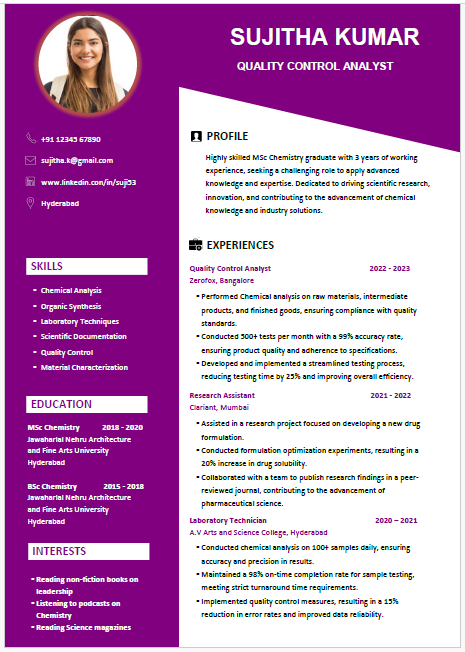Quality Control Analyst
MSc Chemistry

About this template
This is a very colorful and modern resume which can help you stand out from the competition.
Its vibrant design and well-organized layout effectively showcase your skills and achievements, making a lasting impression on potential employers.
Some Important technical skills for Quality Control Analyst
For a Quality Control Analyst, having a robust set of technical skills is crucial to ensure products meet the required standards and specifications. Here are ten important technical skills for the role:
1. Statistical Analysis:
Proficiency in statistical analysis is essential for evaluating data and identifying trends. Quality Control Analysts use statistical methods to interpret test results, assess product quality, and make data-driven decisions about improvements.
2. Knowledge of Quality Standards:
Understanding industry-specific quality standards, such as ISO 9001, is crucial. This knowledge helps ensure that products meet regulatory requirements and adhere to international quality benchmarks.
3. Experience with Testing Methods:
Familiarity with various testing methods, including physical, chemical, and performance tests, is important. Quality Control Analysts must be adept at applying the correct testing procedures to ensure product integrity.
4. Use of Quality Control Tools:
Proficiency with quality control tools and equipment, such as micrometers, calipers, and spectrometers, is essential. These tools are used for measuring and analyzing product features to ensure they meet specifications.
5. Understanding of Quality Management Systems (QMS):
Knowledge of Quality Management Systems, such as Six Sigma or Lean, helps in implementing and maintaining effective quality control processes. This includes understanding methodologies for process improvement and waste reduction.
6. Data Management and Analysis:
Skills in managing and analyzing quality control data are critical. Analysts need to be proficient in using software tools for tracking quality metrics, generating reports, and identifying areas for improvement.
7. Problem-Solving Skills:
Strong problem-solving skills are required to address quality issues and identify root causes of defects. This involves analyzing data, diagnosing problems, and implementing corrective actions to resolve quality concerns.
8. Documentation and Reporting:
Accurate documentation and reporting are vital for tracking quality metrics and compliance. Quality Control Analysts must be skilled in documenting test results, maintaining records, and preparing detailed reports for management review.
9. Familiarity with Regulatory Requirements:
Understanding regulatory requirements relevant to the industry, such as FDA guidelines for pharmaceuticals or CE marking for consumer products, ensures that products comply with legal standards and industry regulations.
10. Knowledge of Product Specifications:
Detailed knowledge of product specifications and manufacturing processes is important. Analysts need to understand the requirements and tolerances for each product to effectively assess quality and ensure conformity.
Conclusion:
These technical skills enable Quality Control Analysts to perform their roles effectively, ensuring that products meet quality standards and regulatory requirements.